There are currently over 1.5 million people in need of shelter in Cameroon as a result of drought and conflict. Minawao Camp in northern Cameroon is sheltering 75,000 people, including refugees who have fled violence in Nigeria.
Kaltoumi B fled to Cameroon from Nigeria. She is one of three women who received ShelterBox aid in Minawao Camp who we regularly visited over six months, to learn about their lives and experiences.
“MY HOUSE WAS AMONG THE MOST BEAUTIFUL ONES IN THE VILLAGE”
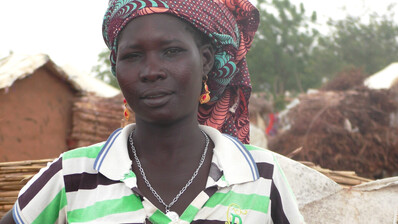
Kaltoumi B is originally from a settlement in North-eastern Nigeria, Borno-State. Surrounded by tropical forest, the area was rich with varying animal and plant species which delighted the local people. Kaltoumi’s home was pleasant, overlooked by a magnificent landscape that sported different colours according to the seasons.
Kaltoumi B lived in a large residence shared with her husband, her co-wife and their children. With her children, she shared a portion of the house, with the apartments of her co-wife adjacent.
“My house was among the most beautiful ones in the village; we all participated in its construction: my husband, my co-wife, me and our children. We wanted a wonderful house.”
Each day, Kaltoumi shared her daily life with her husband, her co-wife and children. On Thursdays she spent her day at the market, selling Bilibili wine, and on Sundays she used to go to church with her family and visited the neighbourhood.
“I WAS STUNNED BY FEAR BECAUSE I QUICKLY REALIZED THAT THIS MIGHT BE OUR LAST HOUR ON EARTH.”
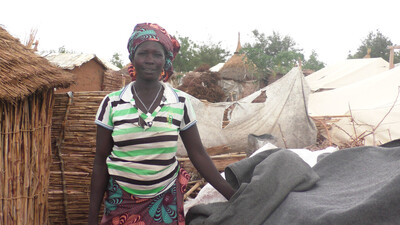
Life was peaceful, Kaltoumi had everything to be happy: a fulfilling job, stable income, a spacious and well-maintained house, beautiful children and in perfect health. She was the mother of 10 children. While conflicts were taking place in nearby villages, Kaltoumi and her family were not ready to give up everything they had built.
Three years ago, Kaltoumi was going about her usual business with her older daughters who were helping her with chores. Everything seemed normal, until a shrill cry startled them all. Kaltoumi jumped up to see what was happening. The field was completely surrounded by armed men.
“They were more than a dozen, armed with rifles, machetes and weapons of all kinds; there were some who were very young, maybe even teenagers, and there were older ones as well. They sneered out loud, as if attending a show in a circus. I was stunned by fear because I quickly realized that this might be our last hour on earth.”
Kaltoumi had heard many testimonies about Boko-Haram’s abuses, but no testimony prepared her for the fear she was now feeling. She was afraid for her life, and her children.
“After surrounding us, we were instructed by rebels to sit on the floor while some women were asked to pack some food in carrying bags. They asked us to keep quiet if we didn’t want to die and that’s exactly what we did. For a few minutes the one who seemed to be the leader looked at us, then pointed to some of our young girls and asked them to stand up, including my daughter. They were 15, 17 and 19 years old.”
“The children obeyed and did exactly what was asked for; the leader shouted: You are all going to become our wives. The other mothers and I shouted in protest, but it was a waste of time, we just managed to make them angrier and that’s when we got severely beaten up.”
After being traumatised, Kaltoumi managed to reach their village to alert other people. On site, there was despair. The village had been lost in a matter of minutes.
Kaltoumi resorted to going deep in the forest. After a few days had passed, Kaltoumi was reunited with her siblings, six of her young children, her co-wife and daughters. Her husband and the two teenage boys of her co-wife did not survive.
Three years later, memories of this nightmare now seem distant for Kaltoumi, who fought like a lioness to reach Cameroon to build a new life at Minawao Camp.
“THESE MOMENTS ALLOW ME TO ESCAPE AND FORGET MY PROBLEMS FOR SOME HOURS.”
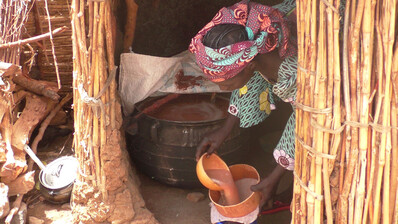
Since her arrival in Cameroon, Kaltoumi has felt like she belongs to a community. On her first day in camp a young woman had been kind enough to share her bed with her. Just a few days in Minawao camp are enough to develop compassion and solidarity towards one’s neighbour.
At the beginning, Kaltoumi did not own much, but over time she managed to start a small business. She prepares and sells traditional homemade wine called Bilibili, an activity through at which she excels, and which was profitable. Her main motivation was the desire for financial autonomy and personal fulfilment. This trade allows her to gather with the community, socialise, discuss and laugh.
“During my activities people join me either at my shed at the market or here at home. I earn some money to buy groceries for my family, and I also take the opportunity to discuss everything with my customers and friends. These moments allow me to escape and forget my problems for some hours.”
“I must admit that I did not expect my daily life to be so difficult. I did not live in opulence in my country but I had no reason to complain because I had not known anything else. In Cameroon we were offered hospitality, we guarantee our safety and we have the minimum to live however, it remains quite difficult.”
“I had to find a way to make money because our biggest opponent is hunger. I told myself that I could continue my activity of before, which was the sale of bilibili. The competition is tough but this doesn’t discourage me. It’s an achievement to successfully start a business here, I’m pretty proud of myself .”
Kaltoumi is filled with pride when her yard is full of customers. When she manages to sell her goods, she is certain to make a profit and therefore put some food on the table.
“I came to realise that my business is quite successful. It’s an activity through which I can flourish and prosper and all I need is some support from any kind and from people like you.”
"IT'S STILL A SPECIAL FEELING TO MEET UP WITH LONG-TIME FRIENDS"
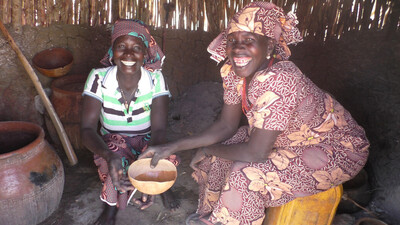
The most common way to relax in Minawao Camp is to chat with your neighbourhood friends. Kaltoumi confirmed she takes great pleasure in chatting with her neighbours. Kaltoumi also takes part in some associative meetings, such as a social group where people meet once a month to discuss topics of common interest.
Thanks to these community groups, Kaltoumi has found friends from her past. These are her friends Falta and Tukuye with whom she immediately reconnected.
“It was a pleasant surprise to meet my friends here at the camp. They left the village long before me; I didn’t have much hope of finding them. I found them at the third meeting of the members of the association and it was a real pleasure to see them again. Even though it’s easy to meet new people here given everyone’s extreme kindness, it’s still a special feeling to meet up with long-time friends.”
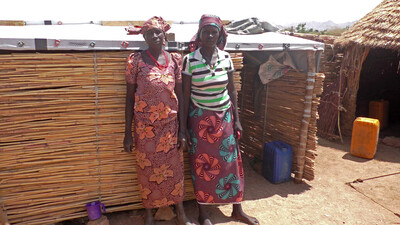
Community involvement is particularly admirable in Minawao Camp. Even though refugees receive a lot of support, people are conscious that it cannot always fully cover their needs.
Communities strive to develop self-sufficiency to reduce dependence on humanitarian aid. Groups are often formed to carry out community service. Kaltoumi has participated in the cleaning of water points, the manufacture of compost for crops, the cleaning of the market after activities. Each inhabitant of Minawao Camp contributes to positively influence this welcome land.
“I WAS ANIMATED BY IMMENSE JOY.”
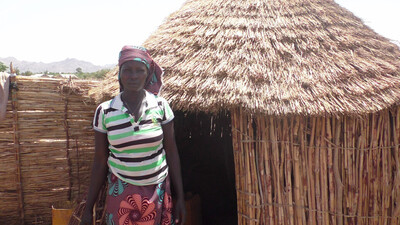
The first dwelling Kaltoumi lived in upon her arrival at Minawao camp was a ShelterBox tent. This shelter was for a very long time her refuge, her most important material asset. She was able to live inside it for more than a year with her whole family before building her semi-durable shelter – “my tent protected my family from the rain, sun and the wind. We felt safe inside our tent.”
“The positive aspect of this tent is mainly the fact that it is very spacious. I had my own space and the children had theirs. This is the first decent shelter I enjoyed after losing everything. I was animated by immense joy. However, the only issue I had was the heat retention. In addition, the tent does not effectively withstand heavy rains.”
Since arriving at Minawao camp, Kaltoumi has received assistance from ShelterBox twice, including the tent and household items, and the tarpaulin and rope used as part of her semi-durable home. Kaltoumi believes that the assistance from ShelterBox has been invaluable. It has been an opportunity for her to rebuild her life.
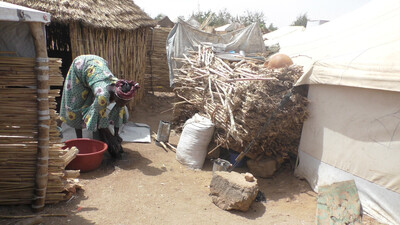
“ShelterBox’s assistance was one of the first I was able to receive when I arrived at the camp. After my relocation, I received a complete package for the kitchen. In addition, there were pots, mats, blankets. I used them for quite a while but over time many items deteriorated. These articles have been very useful in my daily life. I had nothing with me when I got here. It was part of my very first possessions. Of course, my daily life has improved significantly to the extent that I was now able to prepare my meals, have a space of my own and that includes some privacy. I felt rich to own something once more.”
Having a semi-durable home is seen as a mark of resilience and full integration inside the camp. Many aspire to find relative stability by building a resilient house that will offer permanent protection. Succeeding in this challenging environment is therefore a great relief for Kaltoumi. She is the owner of a shelter and many household items still in good condition. She finds her shelter beautiful and strong enough to resist to any type of weather.
"I WANT MY CHILDREN TO HAVE A DIFFERENT AND BETTER LIFE THAN MINE"
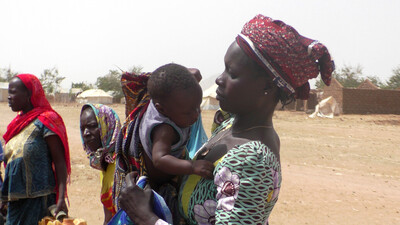
Having a new space has meant Kaltoumi’s life has undergone many positive changes. Kaltoumi’s living conditions have been greatly improved and she is running a profitable business. With the money she is able to earn, she feeds her family and collects some saving for future projects. Kaltoumi plans on buying some sheet metal to cover the roof which is a more permanent material. In addition, she plans to acquire a plot of land where she can cultivate. Kaltoumi’s ambition regarding her business is to start another stock of bilibili with a neighbour who will help her market it. Finally, the young woman hopes a better future for her children.
“I want my children to have a different and better life than mine; I do not wish them to live in armed conflict areas. Agriculture, livestock are very lucrative sectors here in the Far North and I want them to excel. I would like to express my gratitude to ShelterBox. I know that the task is arduous so only God will give you back the good you do for us.”
